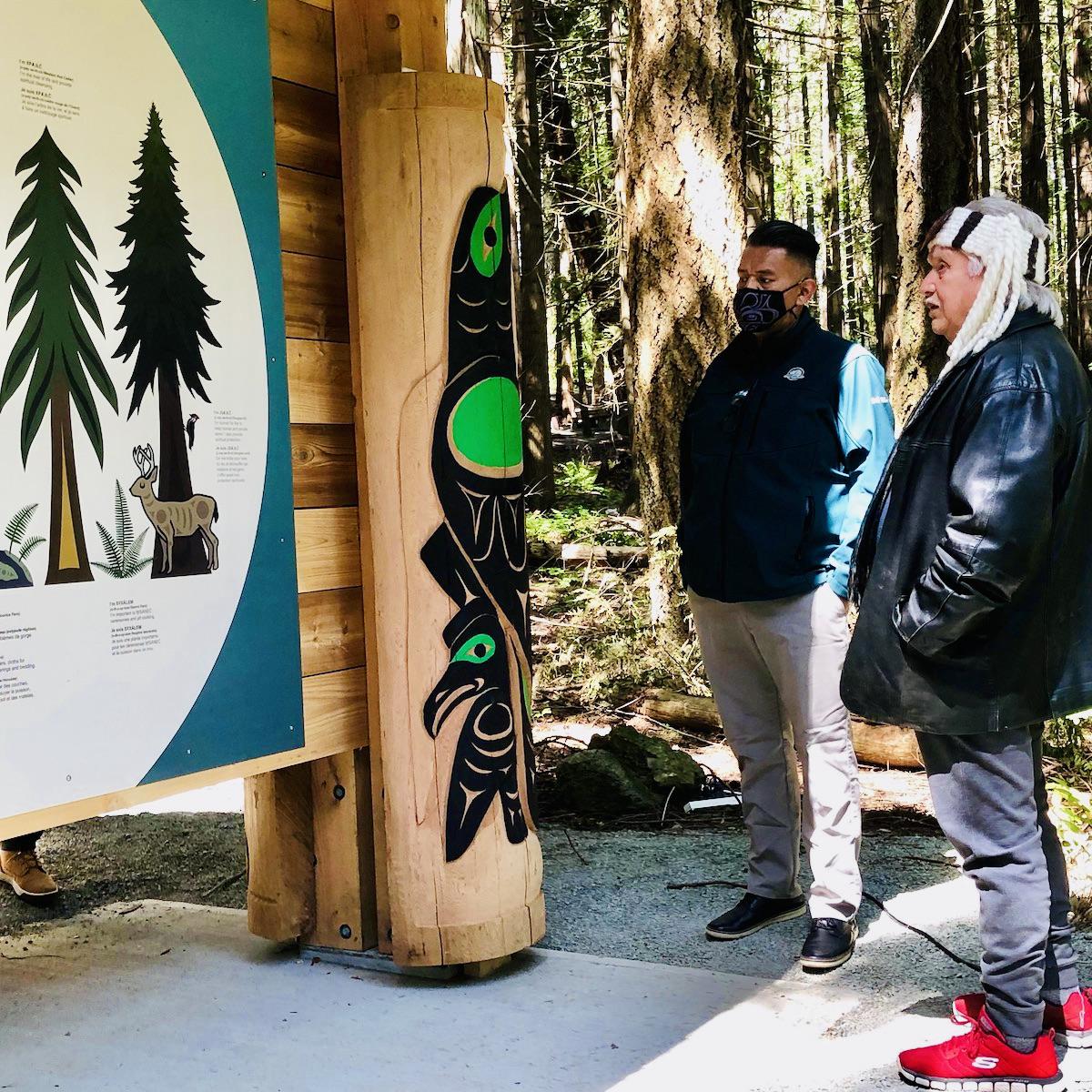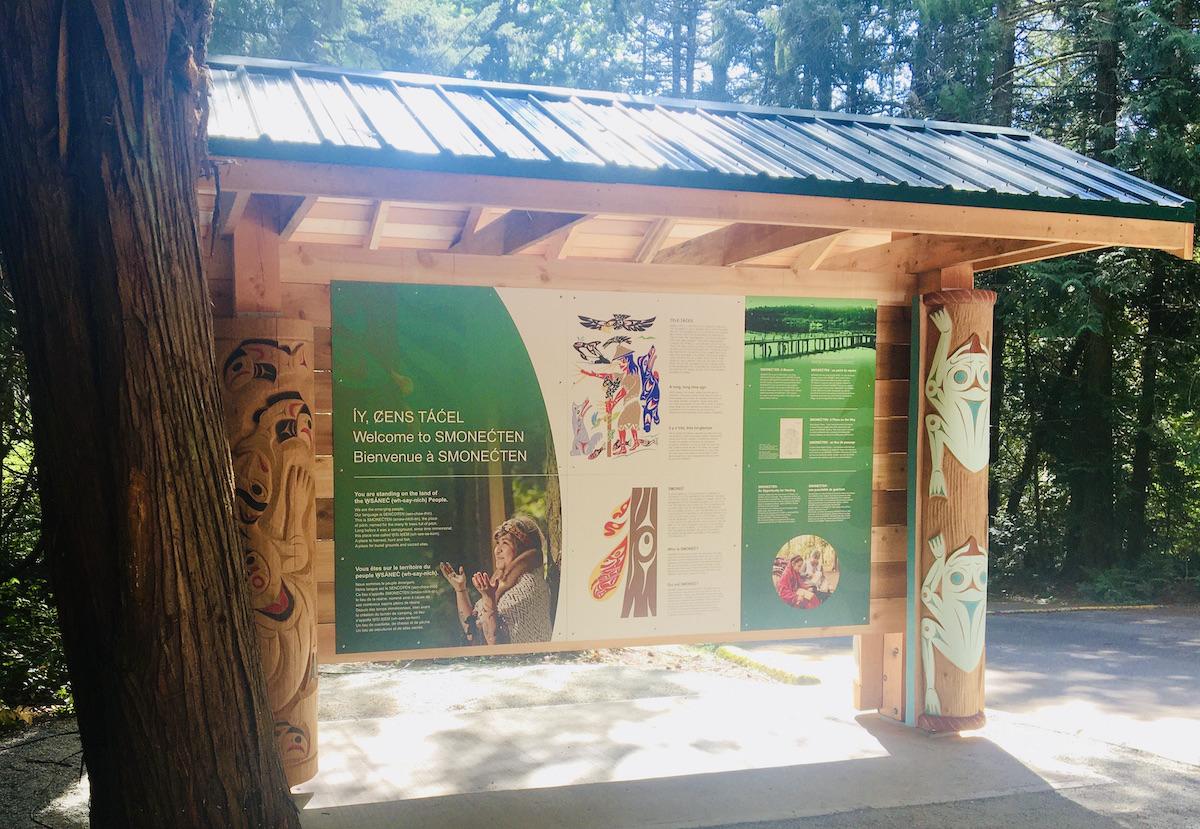
Admiring new signage at Gulf Islands National Parks Reserve/Parks Canada
In what’s being called “a step toward healing,” McDonald Campground in Gulf Islands National Park Reserve has been renamed SMONEĆTEN (pronounced smaw nitch tun) and the Douglas fir forest that it's in will be a place to appreciate Indigenous culture as well as nature.
The new name comes from the local SENĆOŦEN (pronounced sen chaw thun) language and means “fir pitch place.” Four hand-carved cedar panels and an interpretive display have been installed at the campground as part of the reinstatement of W̱SÁNEĆ language, history and culture on the land. The displays share how the site was once a place to gather liquid pitch, also known as sap, from Douglas fir trees to start fires, patch canoes, heal wounds and light lanterns.
The name change comes from a collaboration between Parks Canada and W̱SÁNEĆ (pronounced wh say nich) First Nations, whose people have been stewards of the land since time immemorial.
It was announced this week by Jonathan Wilkinson, Minister of Environment and Climate Change and Minister responsible for Parks Canada, and Chief Don Tom, W̱SÁNEĆ Leadership Council Chair.
“In the heart of W̱SÁNEĆ Territory, right next to the old village of W̱SI,I,KEM, SMONEĆTEN is a place where people would go to harvest the materials they needed to thrive,” said Tom in a news release. “As these places were taken from W̱SÁNEĆ people, new names were placed on the landscape and our presence in the eyes of settlers was diminished. But, within W̱SÁNEĆ culture, this information was never forgotten. We held it tight to our chest waiting for people to listen once again. Today, I am proud to see the government begin the process of listening by taking these small steps toward preserving and honouring W̱SÁNEĆ culture and history.”

New interpretive signs at Gulf Islands National Park Reserve/Parks Canada
Wilkinson said that Parks Canada and Indigenous peoples are partners in conserving natural and cultural heritage and sharing the stories of these treasured places. The renaming and enhancements of this campground in British Columbia “will help Canadians gain further appreciation of local Indigenous culture, while ensuring W̱SÁNEĆ community members of all ages see their culture and language reflected back on these lands of enduring significance.”
SMONEĆTEN will continue to serve as a seasonal Parks Canada campground in Gulf Islands, as well as a place for forest walks. Parks Canada will resume public programs such as Learn-to-Camp and evening campfires, often led by local Indigenous presenters, when it is safe to do so.
Parks Canada is committed to a system of national heritage places that recognizes and honours the historic and contemporary contributions of Indigenous peoples, their histories and cultures, as well as the special relationships Indigenous peoples have with ancestral lands and waters. This name change is an important step in that direction.
The newly unveiled hand-carved wood panels at SMONEĆTEN were crafted by carvers from all four First Nations on the Saanich Peninsula: Tsartlip, Pauquachin, Tseycum and Tsawout.
SMONEĆTEN features 49 drive-in and walk-in campsites just north of Sidney on Vancouver Island that are open from May 15 to September 30.
The stretch of forest was protected from encroaching development as a result of a land donation by former Member of the Legislative Assembly of British Columbia, Alexander McDonald, to become McDonald Provincial Park in 1948. This donation will continue to be recognized through an on-site plaque.
In 2003, with the establishment of the national park reserve, this land was transferred from the province to Parks Canada. The federal agency continues to collaboratively develop co-management strategies with Coast Salish First Nations.



Comments
Did the indigenous in this area run campgrounds? Why use a campground to promote a culture largely unrelated to campgrounds?
Oh, we got a live one on a roll here. As the article very clearly states, 1) this campground is in the heart of a surviving indigenous peoples' original territory, right next to one of their old villages, and a place where those indigenous people would go to harvest natural materials for their use; 2) the interpretive display was installed at the campground as part of the reinstatement of their indigenous language, history, and culture on the land now occupied by the campground; and 3) the display specifically informs visitors of how the site was once a place to gather those natural materials. All of which is consistent with both the statement of Jonathan Wilkinson, Minister of Environment and Climate Change and Minister responsible for Parks Canada, who indicated that Parks Canada and Indigenous peoples are partners in conserving natural and cultural heritage and sharing stories of these places and the fact that Parks Canada is committed to a system of national heritage places that recognizes and honours the historic and contemporary contributions of Indigenous peoples, their histories and cultures, as well as the special relationships Indigenous peoples have with ancestral lands and waters.
This is the second time a comment implicitly derogatory to, if not outright discriminatory toward, indigenous people has been posted within only a few days. So, the real question might be why these comments are being allowed.